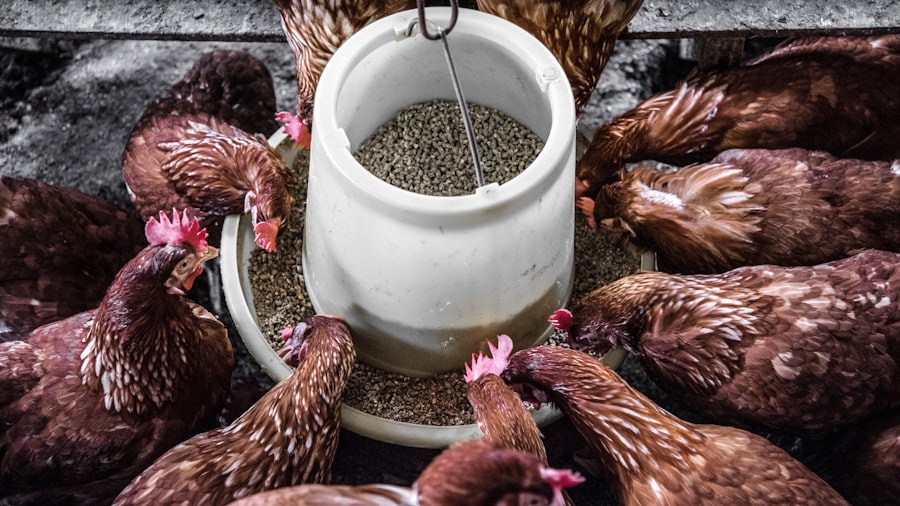Keeping chickens in your backyard has become increasingly popular in recent years, and for good reason. Not only do chickens provide fresh eggs, but they also offer natural pest control and can be a fun and educational addition to your family. Whether you live in a rural area or an urban setting, keeping chickens can be a rewarding experience. In this article, we will explore the basics of keeping chickens in your backyard, including the legalities, choosing the right breed, building a chicken coop, and caring for your chickens.
Key Takeaways
- Keeping chickens in your backyard can be a rewarding and enjoyable experience.
- It is important to understand the legalities of keeping chickens in your area before getting started.
- Choosing the right breed of chickens for your backyard depends on your specific needs and preferences.
- Building a chicken coop requires careful consideration of location, size, and design.
- Feeding and caring for your chickens properly is essential for their health and well-being.
The Legalities of Keeping Chickens in the UK
Before you embark on your chicken-keeping journey, it is important to familiarize yourself with the laws and regulations surrounding keeping chickens in the UK. While it is generally allowed to keep chickens in your backyard, there may be specific rules and restrictions depending on your location. It is crucial to check with your local council before getting chickens to ensure that you are compliant with any regulations.
In some areas, there may be limits on the number of chickens you can keep or specific requirements for the size and design of your chicken coop. Additionally, there may be rules regarding noise levels and the disposal of chicken waste. By doing your due diligence and checking with your local council, you can ensure that you are keeping chickens within the bounds of the law.
Choosing the Right Breed of Chickens for Your Backyard
When it comes to choosing the right breed of chickens for your backyard, there are several factors to consider. Different breeds have different characteristics, such as egg-laying ability, temperament, and size. Some breeds are known for their prolific egg-laying abilities, while others are more docile and friendly.
If you are primarily interested in fresh eggs, you may want to consider breeds such as Rhode Island Reds or Sussex chickens, which are known for their high egg production. On the other hand, if you have children or are looking for chickens that are more friendly and docile, you may want to consider breeds such as Silkies or Orpingtons.
It is also important to consider the size of your backyard and the space you have available for your chickens. Some breeds require more space to roam and may not be suitable for smaller yards. By considering these factors, you can choose the breed of chickens that best suits your needs and the space you have available.
Building a Chicken Coop: Essential Considerations and Tips
A chicken coop is an essential component of keeping chickens in your backyard. It provides a safe and secure space for your chickens to roost, lay eggs, and seek shelter from the elements. When building a chicken coop, there are several essential considerations to keep in mind.
Firstly, ventilation is crucial for the health and well-being of your chickens. Proper airflow helps to prevent the buildup of moisture and ammonia, which can lead to respiratory issues. Make sure to include windows or vents in your chicken coop design to ensure adequate ventilation.
Secondly, predator-proofing is essential to protect your chickens from potential threats such as foxes or rats. Use sturdy materials and secure fencing to prevent predators from gaining access to your chicken coop. Additionally, consider burying wire mesh around the perimeter of the coop to deter digging predators.
Lastly, make sure to provide ample space for your chickens to move around comfortably. The general rule of thumb is to allow at least 4 square feet of space per chicken inside the coop and 10 square feet per chicken in the outdoor run area. By considering these essential considerations, you can build a chicken coop that provides a safe and comfortable environment for your chickens.
Chicken Coop Plans: Where to Find Them and How to Choose the Right One
If you are not confident in designing your own chicken coop, there are plenty of resources available to help you find the right chicken coop plans. One of the most convenient sources is the internet, where you can find a wide variety of free and paid plans. Websites such as Backyard Chickens and The Spruce offer a range of plans for different coop sizes and designs.
Books and magazines are also a great source of chicken coop plans. Look for titles specifically dedicated to backyard chicken keeping, as they often include detailed plans and step-by-step instructions. Additionally, local agricultural or farming organizations may offer workshops or resources on building chicken coops.
When choosing a chicken coop plan, consider factors such as the size of your backyard, the number of chickens you plan to keep, and your level of DIY skills. Some plans may be more complex and require advanced carpentry skills, while others may be simpler and more suitable for beginners. Choose a plan that aligns with your needs and abilities to ensure a successful build.
Materials and Tools Needed to Build a Chicken Coop

Once you have chosen a chicken coop plan, it is time to gather the materials and tools needed for the build. The materials will depend on the design of your coop, but some common materials include wood for framing, wire mesh for fencing, and roofing materials such as shingles or corrugated metal.
When sourcing materials, consider repurposing or recycling materials whenever possible. This not only helps reduce waste but can also save you money. Check local classifieds or online marketplaces for used materials that are still in good condition. Additionally, consider borrowing tools from friends or neighbors if you do not have all the necessary tools on hand.
In terms of tools, some basic tools you may need include a saw, drill, hammer, tape measure, and screwdriver. If you do not have these tools already, consider borrowing or renting them to save money. Alternatively, you can purchase affordable tools from hardware stores or online retailers.
Setting Up the Chicken Coop: Location, Size, and Design
Once you have built your chicken coop, it is time to set it up in your backyard. The location of your chicken coop is an important consideration, as it can affect the health and well-being of your chickens. Choose a location that is well-drained and receives adequate sunlight throughout the day. Avoid placing the coop in low-lying areas that may become waterlogged or shaded areas that may not provide enough sunlight.
The size of your chicken coop will depend on the number of chickens you plan to keep and the space you have available. As mentioned earlier, allow at least 4 square feet of space per chicken inside the coop and 10 square feet per chicken in the outdoor run area. This will ensure that your chickens have enough space to move around comfortably.
When designing the layout of your chicken coop, consider incorporating nesting boxes for your hens to lay their eggs. Nesting boxes should be dark and secluded to provide a sense of privacy for your chickens. Additionally, include perches or roosting bars for your chickens to rest on at night. These should be placed higher than the nesting boxes to encourage your chickens to sleep there.
Feeding and Caring for Your Chickens: Tips and Tricks
Proper feeding and care are essential for the health and well-being of your chickens. Chickens require a balanced diet that includes a combination of commercial feed, fresh water, and supplemental treats. Commercial feed should make up the majority of their diet and should be specifically formulated for laying hens.
Fresh water should be provided at all times, and it is important to regularly clean and refill water containers to prevent contamination. Additionally, chickens enjoy a variety of treats such as fruits, vegetables, and grains. However, treats should only make up a small portion of their diet and should be given in moderation.
In terms of care, chickens require regular cleaning and maintenance. Clean out the coop and nesting boxes regularly to prevent the buildup of waste and bacteria. Additionally, observe your chickens daily for any signs of illness or injury. Early detection and treatment of health issues can help prevent the spread of disease and ensure the overall health of your flock.
Dealing with Common Chicken Health Issues and Diseases
While chickens are generally hardy animals, they can still be susceptible to common health issues and diseases. Some common health issues include mites or lice infestations, respiratory infections, and egg-laying problems. It is important to be vigilant and proactive in preventing and treating these issues.
Regular cleaning and disinfection of the coop can help prevent mites or lice infestations. Additionally, providing dust baths for your chickens can help control external parasites. If you notice any signs of respiratory issues, such as coughing or wheezing, consult a veterinarian for proper diagnosis and treatment.
Egg-laying problems can also occur, such as soft-shelled eggs or egg-binding. Ensure that your chickens have access to a calcium supplement, such as crushed oyster shells, to support proper eggshell formation. If you notice any abnormalities in egg-laying, consult a veterinarian for guidance.
Enjoying the Benefits of Keeping Chickens in Your Backyard
Keeping chickens in your backyard can be a rewarding experience that offers fresh eggs, natural pest control, and a connection to nature. By understanding the basics of keeping chickens, including the legalities, choosing the right breed, building a chicken coop, and caring for your chickens, you can create a thriving flock in your own backyard.
Remember to check with your local council to ensure that you are compliant with any regulations regarding keeping chickens in your area. Choose the right breed of chickens based on your needs and the space you have available. Build a chicken coop that provides a safe and comfortable environment for your chickens, and provide proper feeding and care to ensure their health and well-being.
By following these guidelines and enjoying the benefits of keeping chickens in your backyard, you can embark on a rewarding journey that brings fresh eggs, natural pest control, and a sense of fulfillment to your life. For further information and resources on keeping chickens, consult reputable websites, books, and local agricultural organizations.
If you’re wondering whether you can keep chickens in your backyard in the UK, you’ll be pleased to know that it is indeed possible. However, before diving into this exciting venture, it’s important to have a suitable chicken coop. In an informative article by Poultry Wizard, they provide valuable insights on how to create a garden chicken coop that meets the needs of your feathered friends. This article offers practical tips and advice on designing and building a coop that ensures the safety and comfort of your chickens. To learn more about creating the perfect chicken coop for your backyard, check out Poultry Wizard’s article on garden chicken coops.
FAQs
What are the rules and regulations for keeping chickens in my backyard in the UK?
In the UK, there are rules and regulations that govern the keeping of chickens in your backyard. These rules are designed to ensure that the chickens are kept in a safe and healthy environment, and that they do not cause any nuisance to your neighbors.
Do I need planning permission to keep chickens in my backyard in the UK?
In most cases, you do not need planning permission to keep chickens in your backyard in the UK. However, if you live in a conservation area or a listed building, you may need to seek permission from your local council.
How many chickens can I keep in my backyard in the UK?
The number of chickens you can keep in your backyard in the UK will depend on the size of your garden and the space you have available. As a general rule, you should allow at least 1 square meter of space per chicken.
What kind of housing do I need for my backyard chickens in the UK?
You will need to provide your backyard chickens with a suitable housing that is secure, dry, and well-ventilated. The housing should also be large enough to accommodate all of your chickens comfortably.
What do backyard chickens in the UK eat?
Backyard chickens in the UK can be fed on a variety of foods, including commercial chicken feed, grains, vegetables, and fruit. It is important to ensure that your chickens have access to clean water at all times.
Do I need to register my backyard chickens in the UK?
In the UK, you do not need to register your backyard chickens unless you have more than 50 birds. However, it is recommended that you keep a record of the number of chickens you have and any movements in and out of your property.
Meet Walter, the feathered-friend fanatic of Florida! Nestled in the sunshine state, Walter struts through life with his feathered companions, clucking his way to happiness. With a coop that’s fancier than a five-star hotel, he’s the Don Juan of the chicken world. When he’s not teaching his hens to do the cha-cha, you’ll find him in a heated debate with his prized rooster, Sir Clucks-a-Lot. Walter’s poultry passion is no yolk; he’s the sunny-side-up guy you never knew you needed in your flock of friends!







